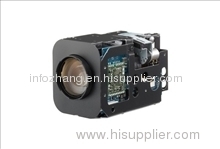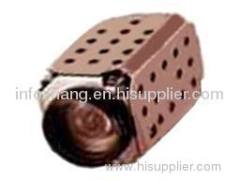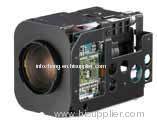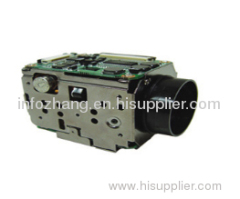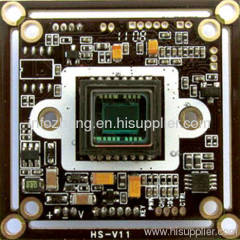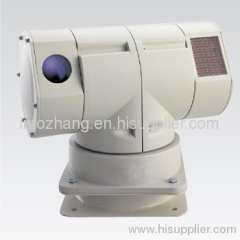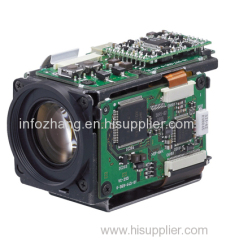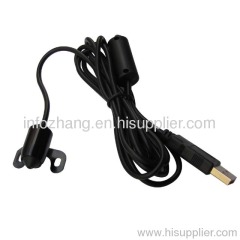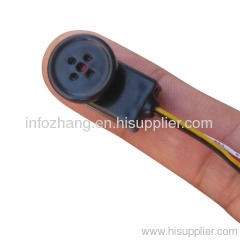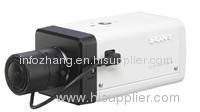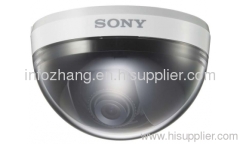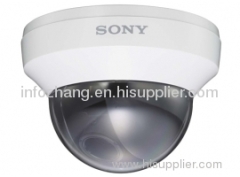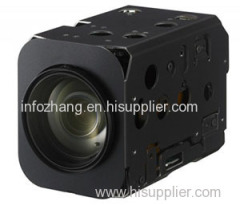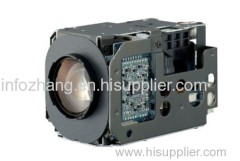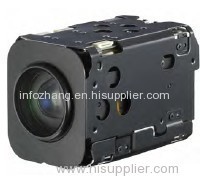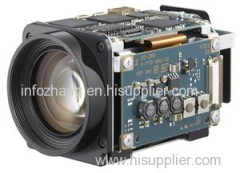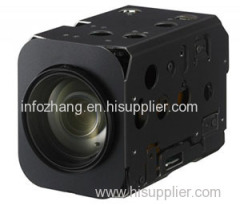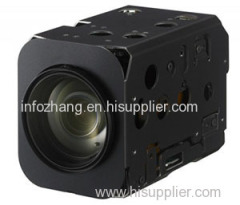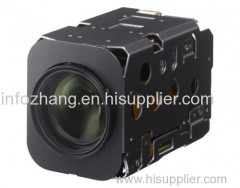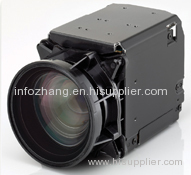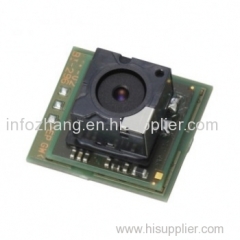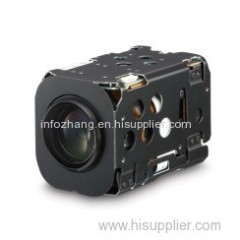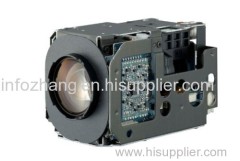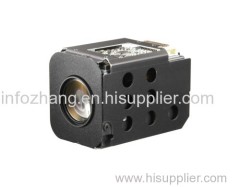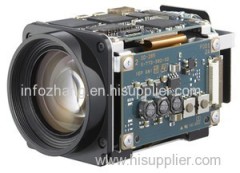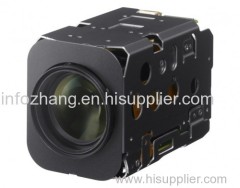|
shitong Co.,LTD
|
Sony FCB-EH3100 Full HD CMOS 10X Video Color Camera
| Price: | 201.0 USD |
| Payment Terms: | T/T |
| Place of Origin: | Guangdong, China (Mainland) |
|
|
|
| Add to My Favorites | |
| HiSupplier Escrow |
Product Detail
The CMOS video camera provides 2,000,000 effective picture elements (pixels) that can shoot high-definition images to offer superior picture
quality.
* The camera is compatible with 8 formats, including the Full HD
(1080i high definition) video format, which is equivalent to an HD-TV
broadcast.
* HD: 1080i/59.94, 1080i/50, 720p/59.94, 729p/50
* SD: NTSC (CROP), NTSC (SQUEEZE)
* PAL (CROP), PAL (SQUEEZE)
* Video outputs
* HD: Analog Component, Digital (LVDS)
* SD: VBS, Y/C
* The camera is equipped with an ×10 optical auto focus zoom lens.
* The ×12 digital zoom function allows you to zoom up to ×120, combined with a optical zoom.
*
An infrared (IR) Cut-Filter can be disengaged from the image path for
increased sensitivity in low light environments. The ICR will
automatically engage depending on the ambient light, allowing the camera
to be effective in day/night environment.
* The VISCA is a communication protocol, which enables the camera to be controlled from a computer.
*
You can select the baud rate from among 9600 bps,19200 bps, or 38400
bps. This allows you to remotely control the camera at a high
communication speed.
* The position preset function allows the camera
to store up to six combinations of settings of camera shooting
conditions. Also, the custom preset function allows you to customize the
initial settings of each function when the power of the camera is
turned on.
Sony FCB-EH3100 Specifications:
In general:
* Power On/Off
Powers the camera on and off. When the power is
off, the camera is able to accept only the lowest level of VISCA
Commands; the display and other features
are turned off.
* I/F clear
Clears the Command buffer of the FCB camera.
Clearing the buffer can also be carried out from the control application software when the power is on.
* Address set
VISCA
is a protocol, which normally can support a daisy chain of up to seven
attached devices. In this case, if addresses from 1 to 7 are assigned to
each of
7 devices, you can control seven cameras with the same
personal computer. However, the FCB camera does not support connection
of cameras in a daisy
chain. Therefore, whenever a camera is connected for the first time, be sure to use the address set to confirm the address.
* ID Write
Sets the camera ID.
* Mute
Blanks the screen and sends out a synchronizing signal.
Zoom
* The camera employs an 10× optical zoom lens combined with a digital zoom function allowing you to zoom up to 120×.
* Lens specifications: Optical 10×, f = 5.1 mm to 51 mm (F1.8 to F2.1)
* The horizontal angle of view is approximately 50 degrees (wide end) to 5.4 degrees (tele end).
*
Digital Zoom enlarges the center of the subject by expanding each image
in both the vertical and horizontal directions. When 12× digital zoom
is used,the number of effective picture elements in each direction
reduces to 1/12 and the overall resolution deteriorates.
Focus
Focus has the following modes, all of which can be set
using VISCA Commands.
* Auto Focus Mode
The Auto Focus (AF) function automatically
adjusts the focus position to the high frequency content of the picture
in a center measurement area, taking into
consideration the high luminance and strong contrast components.
The
minimum focus distance is 10 mm at the optical wide end (extreme
close-up settings with VISCA control) (distance from the front end of
the lens).
Normal AF Mode
This is the normal mode for AF operations.
- Interval AF Mode
The
mode used for AF movements carried out at particular intervals. The
time intervals for AF movements and for the timing of the stops can
be set in one-second increments using the Set Time Command. The initial
value for both is set to five
seconds.
- Zoom Trigger Mode
When
the zoom is changed with the TELE or the WIDE buttons, the pre-set
value (initially set at 5 seconds) becomes that for AF Mode. Then,
it stops.
* Manual Focus Mode
MF (Manual Focus) has both a
Standard Speed Mode and a Variable Speed Mode. Standard Speed Mode
focuses at a fixed rate of speed. Variable Speed Mode has eight speed
levels that can be set using a VISCA Command.
To stop the required operation after sending a Standard Speed command or a Variable Speed command, send the Stop command.
* One Push Trigger Mode
When a Trigger Command is received, the
lens moves to adjust the focus for the subject. The focus lens then
holds the same position until the next Trigger Command is input.
* Infinity Mode
The lens is forcibly moved to a position suitable for an unlimited distance.
* Near Limit Mode
Can be set in a range from about 4.5 m (2000) to 1 cm(C000).
The focus range is narrowed by excluding the unnecessary range.
White Balance
White Balance has the following modes, all of which can be set using VISCA Commands.
* Auto White Balance
This mode computes the white balance value
output using color information from the entire screen. It outputs the
proper value using the color temperature
radiating from a black subject based on a range of
values from 3000 to 7500K.
This mode is the default setting.
* Indoor
3200 K Base Mode
* Outdoor
5800 K Base Mode
* One Push WB
The
One Push White Balance mode is a fixed white balance mode that may be
automatically readjusted only at the request of the user (One Push
Trigger),assuming that a white subject, in correct lighting conditions
and occupying more than 1/2 of the image,is submitted to the camera.
One Push White Balance data is lost when the power is turned off. If the power is turned off, reset the One
Push White Balance.
* Manual WB
Manual control of R and B gain, 256 steps each
Automatic Exposure Mode
The variety of AE functions, which allow
video signal to output the optimum image for subjects from low light
conditions to bright light conditions, are available.
* Full Auto
Auto Iris and Gain, Fixed Shutter Speed (59.94/NTSC: 1/60 s, 50/PAL: 1/50 s)
* Slow shutter limit
Lower
limit of the slow shutter mode in the Full Auto mode. For the
59.94/NTSC video format, select the lower limit from among 1/60, 1/30,
1/15, 1/8, 4/1 or
1/2.
For the 50/PAL video format, select the lower limit from among 1/50, 1/25, 1/12, 1/6, 1/3 or 1/2.
* Shutter Priority 1)
Variable Shutter Speed, Auto Iris and Gain(1/2 to 1/10,000 s, 21 steps, high speed shutter: 15 steps,slow shutter: 6 steps)
* Iris Priority
Variable Iris (F1.8 to Close, 18 steps), Auto Gain and Shutter speed.
* Manual
Variable Shutter, Iris and Gain.
* Bright
Variable Iris and Gain (Close to F1.8, 18 steps at 0 dB: F1.8, 6 steps from 0 to 18 dB)
* Spot light
Avoids a situation where the face of the subject is over-illuminated, and becomes whitish.
* AE – Shutter Priority
The shutter speed can be set freely by the user to a total of 21 steps – 15 high speeds and 6 low speeds.
When
the slow shutter is set, the speed can be 1/30,1/15, 1/8, 1/4, or 1/2
s. The picture output is read at a normal rate from the memory. The
memory is updated
at a low rate from the CMOS. AF capability is low.
In
high speed mode, the shutter speed can be set up to 1/10,000 s. The
iris and gain are set automatically,according to the brightness of the
subject
* AE – Iris Priority
The iris can be set freely by the user to 18 steps between F1.8 and Close.
The gain and shutter speed are set automatically according to the brightness of the subject.
* AE – Manual
The shutter speed (21 steps), iris (18 steps) and gain (8 steps) can be set freely by the user.
* AE – Bright
The
bright control function adjusts both the gain and iris using an
internal algorithm according to a brightness level freely set by the
user. Exposure is
controlled by gain when dark and by iris when bright.
As
both gain and iris are fixed, this mode is used when exposing at a
fixed camera sensitivity. When switching from Full Auto or Shutter
Priority Mode to Bright
Mode, the current status will be retained for a short period of time.
Only when the AE mode is set to "Full Auto" or "Shutter Priority," the user can switch it to "Bright."


